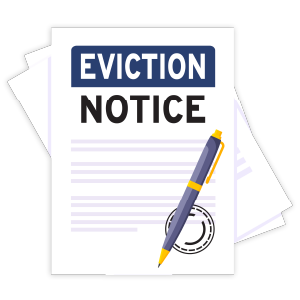Trusted Eviction Attorney Advocating for Newark Landlords
Do you need to remove a problem tenant from your property in Newark?
Our firm helps landlords evict tenants for failing to pay rent, lease violations, property damage, overstaying, and illegal or disruptive behavior.
We focus on quick and successful evictions. Our goal is for you to regain control of the premises, collect rent, protect your investment, and eliminate stress caused by difficult tenants. Contact us today to begin removing your tenant.
Contact Us and Next Steps
Call (201) 627-2457 or fill in our online form any time to contact our team.
We gather general information about the tenant, premises, and lease. An attorney experienced in evictions then consults with you to determine the best course of action to address the circumstances with the Newark tenant.
Once our firm is retained, services include serving formal notices upon the tenant, filing eviction complaints, attending hearings, and obtaining the warrant of removal. We make the process as smooth and efficient as possible and ensure your rights are protected.
Contact Us
Call (201) 627-2457 or fill in our online form any time to contact us. We gather basic information regarding the tenant circumstances, lease, and premises.

Case Consult
A landlord attorney speaks with you to review the facts, discuss the matter, and advise on the best next steps for removing the tenant.

Eviction
Our firm is retained and as required serves the eviction notice, files the complaint, attends the hearing, and obtains the warrant of removal.
Why Choose Our Newark Eviction Legal Services?
Focused Representation for Landlords. Our firm only represents landlords in evictions and as a whole specializes in real estate. This focus allows us to provide strategic legal strategies for your needs. Your priorities and goals are at the forefront of every decision.
Comprehensive Support. Eviction proceedings have many steps. Our firm handles every aspect from initial notices through lockout. We act with precision, professionalism, and we keep you informed as the tenant removal progresses.
Efficient Eviction Process. Evictions can be complex and time-consuming. Since we specialization in real estate and landlord representation, the eviction process is streamlined and remains complaint with all legal requiements. Our process is designed to minimize stress, limit financial loss, and to regain control of your property quickly and legally.
Protection of Your Property Rights. Real estate is an investment in you and your family’s financial future. We are committed to protecting it in the long and short term. Beyond tenant removal, our firm drafts air-tight leases and takes legal action to collect unpaid rent or compensation for destruction. With your special circumstances in mind, we also represent you in purchase and sales, land-use and zoning, tax appeals, and estate planning.
Understanding the Newark Eviction Process
Notice to Quit and Eviction Filing
Evictions in Newark begin with a notice to quit which informs the tenant of the grounds for eviction and gives them a chance to fix the situation or vacate the property. Evictions must be based upon “good cause” and standard grounds for evictions include:
- Non-Payment of Rent: Tenant fails to pay rent as agreed in the lease or oral agreement.
- Habitual Late Payment: Tenant consistently pays rent late.
- Violation of Lease Terms: Tenant breaks a specific lease condition, such as unauthorized pets or occupants.
- Damage to Property: Tenant causes substantial property damage.
- Illegal Activity: Tenant engages in illegal activities, such as drug use or criminal behavior.
- Disruptive Behavior: Tenant causes excessive disturbances or creates an unsafe environment for others.
- Refusal to Leave After Lease Expiration: Tenant “holds over” after the lease has ended and new terms were not accepted.
- Health Code Violations: Tenant violates health or safety regulations, making the property unsafe for themselves and others.
- Owner Move-In or Sale: The landlord wishes to take possession of the property for personal use or to sell it.
- Failure to Pay Rent Increase: The tenant refuses to pay a legally justified rent increase after proper notice.
If the tenant fails to comply with the notice, our firm will file an eviction complaint in the Special Civil Part court on your behalf.
Court Representation
The courts will set a date for hearing and trial after receipt of the complain. We represent landlords at the highest level in settlement negotiations with the court and tenant, and if necessary, presenting evidence and arguing the merits of the eviction with your case front and center.
Our attorneys are ready to respond to any defenses the tenants may raise. Tenants may (with or without cause) argue:
- Improper Notice: Landlord failed to properly serve or give the required legal notice for eviction.
- Retaliation: The eviction is in retaliation for the tenant exercising legal rights, like reporting code violations.
- Uninhabitable Conditions: Landlord didn’t maintain a livable property, justifying rent withholding.
- Rent Paid or Dispute: Tenant has paid rent in full or disputes the amount the landlord claims.
- Waiver by Landlord: Landlord accepted rent after knowing about the lease violation, waiving the right to evict.
- Filing Errors: The eviction complaint was improperly filed or incomplete.
- Discrimination: The eviction is based on illegal discrimination.
- Lack of Landlord Registration and Certificate of Occupancy: Landlord failed to obtain necessary government approvals for leasing the premises.
- Payment Agreement: The tenant complied with an agreement to pay overdue rent.
- Illegal Lockout: Landlord physically locked out the tenant with illegal “self help”.
Judgment for Possession
Once the court approves the order of eviction, we obtain a judgment for possession. The judgment of possession is a court order that requires the tenant to vacate the premises and you to legally regain control of the premises.
Warrant of Removal
After the Judgment of Possession is issued, the landlord can request a Warrant of Removal. This warrant allows the sheriff to physically remove the tenant if they fail to leave voluntarily. In Newark, the tenant is usually given a few days (often three) after the warrant is issued to vacate the property.
Post-Eviction Legal Support
There may be additional legal matters, such as recovering unpaid rent or compensation for damages to the property. Our firm assists in these matters as well.
Additional Landlord Services: Security Deposit Disputes and Rent Collection
Security Deposit Disputes
Disputes over security deposits are common in landlord-tenant relationships. As a specialized real estate law firm, we provide skilled representation to ensure that your rights as a landlord are protected. We help you navigate the complexities of Newark’s security deposit laws, ensuring that all procedures are followed correctly and that you can defend any rightful deductions from the deposit. If a tenant disputes your deductions, we’re ready to represent you in court or negotiate a resolution that favors your position, all while delivering excellent client service.
Rent Collection and Enforcement
Consistent rent payments are essential to maintaining the profitability of your rental properties. Our firm offers comprehensive rent collection services, including drafting demand letters, negotiating payment plans, and taking legal action against tenants who fail to pay. Our client-centered approach ensures that we recover the money owed to you while keeping you informed and supported throughout the process. If necessary, we’ll take decisive legal action, including filing for eviction based on non-payment and pursuing judgments for unpaid rent, always with a focus on providing the best possible service.
Who Can Benefit from Our Eviction and Landlord Services?
Residential Landlords
Our firm assists owners of residential buildings with evictions which includes single-family homes, apartments, or multi-unit buildings. Whether you own single-family homes, apartments, or multi-unit buildings, we help you navigate the eviction process and other landlord challenges to protect your rental income. As a specialized real estate law firm, we bring the expertise needed to handle your legal needs with precision and care.
Commercial Property Owners
Commercial evictions can be complex, involving lease agreements, business operations, and more. Commercial tenants may also be more affluent and more likely to have hired their own defense attorneys. Our specialization in real estate and landlord-tenant laws ensures that your business interests are also protected.
Property Management Companies
Our firm will partner with and work in tandem with property management firms to provide legal support during evictions, rent collection, and security deposit disputes. We make sure the operations and conduct with the tenant complies with New Jersey law.
FAQs About Evictions in Newark
How long does the eviction process take in Newark?
Eviction timing in Newark varies depending on case specifics and the county. Typically, it takes a few weeks to several months. The time is impacted by the reason for eviction, tenant’s response, and court availability. Our office keeps you informed as the eviction case progresses.
What are the legal grounds for eviction in Newark?
Landlords can evict tenants in Newark for several reasons, including non-payment of rent, violation of lease terms, damage to the property, or illegal activities. Additionally, landlords may seek eviction if a tenant remains after the lease has expired if the landlord intends to move-in or seller to an owner occupant.
What should I do if a tenant is not paying rent?
If your tenant is not paying rent, the first step is to issue a Notice to Quit, informing the tenant of their non-payment and the amount owed. If the tenant fails to pay or vacate the property after receiving the notice, you can file an eviction complaint with the court. Our firm specializes in handling these situations and will assist you in taking the necessary legal steps to recover your property and any owed rent, while ensuring all actions are compliant with local and state law.
How can I legally remove a tenant from my property?
Eviction is the method to legally remove a tenant from property in New Jersey. This process begins with issuing a Notice to Quit, followed by filing an eviction complaint if the tenant does not comply. The court then issues a judgment of possession if the eviction hearing is succesful. Once the judgement of possession is issued, you can obtain a warrant of removal which allows law enforcement to forcibly remove the tenant.
What happens if a tenant refuses to leave after an eviction notice?
If a tenant refuses to leave after receiving an eviction notice, you cannot forcibly remove them yourself. Instead, you must proceed with the legal eviction process. This involves filing a complaint with the court and attending a hearing. If the court rules in your favor, a warrant of removal will be issued, allowing law enforcement to evict the tenant.
Can I recover unpaid rent after evicting a tenant?
Landlords can pursue legal action to recover unpaid rent after an eviction. This requires obtaining a judgment against the tenant for the amount owed. Once a court judgment is issued, the tenant would be legally occupied to pay the unpaid rent. Should the tenant fail to comply with the court order, there are ways to enforce it such as wage garnishment or bank levies.
Contact Us Today for Professional Eviction and Landlord Services
Our firm is here to help you remove a problem tenant from your property in Newark. We assist landlords with evicting tenants for non-payment of rent, lease violations, property damage, overstaying, and illegal or disruptive behavior.
With a focus on quick and successful evictions, we aim to help you regain control of your property, collect rent, protect your investment, and eliminate stress caused by difficult tenants. Contact us today at (201) 627-2457 or simply fill out the form below to get started.
